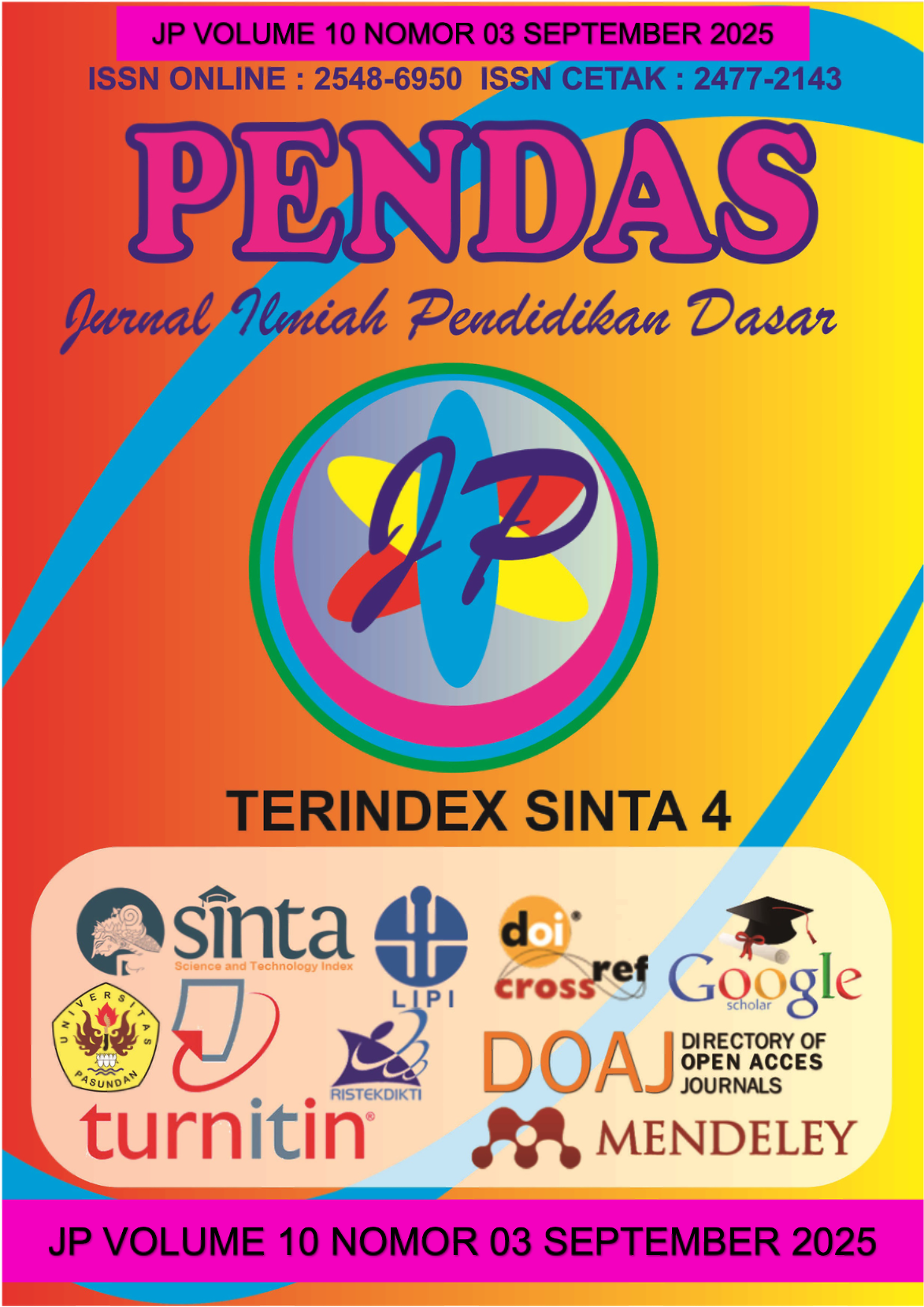MEDIA PEMBELAJARAN INTERAKTIF KHAN ACADEMY KIDS UNTUK MENINGKATKAN SOCIAL SKILL SISWA DI SEKOLAH DASAR
DOI:
https://doi.org/10.23969/jp.v10i03.31911Keywords:
Learning Media, Social Skills, Khan Academy KidsAbstract
Current learning requires interactive media for students to improve social skills. The purpose of this study was to determine whether there was an increase in students' social skills in the experimental class that participated in learning using the Khan Academy Kids application compared to the control class. This study used a quantitative design with an experimental approach. The study was conducted using two groups, namely the experimental group that used the Khan Academy Kids application and the control group that followed conventional learning. The subjects of this study were 60 3rd grade elementary school students at SDN Sunter Jaya 07 Jakarta. They were divided into two groups: one experimental group that used Khan Academy Kids and one control group. There was a significant increase in students' social skills in the experimental class that participated in learning using the Khan Academy Kids application, compared to students in the control class that followed conventional learning. This increase was seen from the results of the average pre-test and post-test scores, Experimental Class: from 58.2 to 78.6 while Control Class: from 56.5 to 70.3. Aspects of social skills that experienced improvement included communication, cooperation, empathy and self-control.
Downloads
References
Ariowibowo, K., Farhan, M., Marini, A., & Yunus, M. (2024). Integrasi Teknologi dalam Pembelajaran IPS: Penggunaan Aplikasi dan Platform Digital untuk Meningkatkan Interaksi Siswa. Cendekia Pendidikan, 4(4), 50–54. https://doi.org/10.9644/sindoro.v3i9.252
Badriya, L., Vitrianingsih, Y., Masnawati, E., Muniarti, D., & Samuji. (2024). Edukasi Parenting Dalam Membentuk Karakter Siswa Di TK Ar Rohma Surabaya. TAAWUN : Jurnal Pengabdian, 03(02), 80–88.
Bush, M. D., Mott, J. D., Bush, M. D., & Mott, J. D. (2009). The Transformation of Learning with Technology: Learner-Centricity, Content and Tool Malleability, and Network Effects Author(s): Educational Technology Publications, 49(2), 3–20.
Celina, A., Ramadhina, D. A., Kartika, S., Marini, A., & Yunus, M. (2024). Analisis Model VCT Dalam Pembentukan Moral Siswa Pada Pembelajaran IPS Kelas IV SD. Cendekia Pendidikan, 4(4), 50–54.
Chi, M. T. H. (2009). Active-Constructive-Interactive: A Conceptual Framework for Differentiating Learning Activities. Topics in Cognitive Science, 1(1), 73–105. https://doi.org/10.1111/j.1756-8765.2008.01005.x
Dinda Putri, Yunus, M., Luthfiyah, A., & Kristoper, P. (2016). Kontribusi Mahasiswa PGSD dalam Penguatan Kesadaran Multikultural di Masyarakat Melalui Praktik Edukatif. Jurnal Pendidikan Sekolah Dasar, 2(01), 2.
Gan, B., Menkhoff, T., & Smith, R. (2015). Enhancing students’ learning process through interactive digital media: New opportunities for collaborative learning. Computers in Human Behavior, 51, 652–663. https://doi.org/10.1016/j.chb.2014.12.048
Hanna, D. E. (2019). Higher education in an era of digital competition: Emerging organizational models. In Online Learning Journal (Vol. 2, Issue 1). https://doi.org/10.24059/OLJ.V2I1.1930
Herawati, Suntari, Y., Usman, H., & Yunus, M. (2023). Analisis Kebutuhan Media Pembelajaran Berbasis Augmented Reality Di Sd Negeri Wates. Prosiding Teknologi Pendidikan, 3(1), 1–4. http://pkm.uika-bogor.ac.id/index.php/PTP/article/download/1731/1191
Herlina, U., Yunus, M., Yarmi, G., Fajri, H. M., Sinyanyuri, S., & Siregar, Y. E. Y. (2025). Penerapan Pendekatan Deep Learning Pada Pembelajaran Di Sekolah Dasar Kota Bekasi. El Banar : Jurnal Pendidikan Dan Pengajaran, 8(1), 72–79. https://doi.org/10.54125/elbanar.v8i1.539
Kamila, A. D., Fiqriah, A., Azmi, F., Marini, A., & Yunus, M. (2024). Penerapan Teori Belajar Humanistik dalam Meningkatkan Prestasi Belajar Peserta Didik pada Pembelajaran di SD. Cendekia Pendidikan, 3(6), 101–112. https://doi.org/10.9644/sindoro.v3i9.252
Kennewell, S., Tanner, H., Jones, S., & Beauchamp, G. (2008). Analysing the use of interactive technology to implement interactive teaching: Original article. Journal of Computer Assisted Learning, 24(1), 61–73. https://doi.org/10.1111/j.1365-2729.2007.00244.x
Kuzmenko, A., Chernova, T., Kravchuk, O., Kabysh, M., & Holubenko, T. (2023). Innovative Educational Technologies: European Experience and its Implementation in the Training of Specialists in the Context of War and Global Challenges of the 21st Century. Journal of Curriculum and Teaching, 12(5), 68–81. https://doi.org/10.5430/jct.v12n5p68
Maulidya, A., Varathi, K., Marini, A., & Yunus, M. (2024). Peran Kemampuan Sosial dalam Mendorong Partisipasi Siswa pada Pembelajaran IPS SD. Cendekia Pendidikan, 4(4), 50–54. https://doi.org/10.9644/sindoro.v3i9.252
McDiarmid, G. W., & Zhao, Y. (2023). Time to Rethink: Educating for a Technology-Transformed World. ECNU Review of Education, 6(2), 189–214. https://doi.org/10.1177/20965311221076493
Mehlenbacher, B., Miller, C. R., Covington, D., & Larsen, J. S. (2000). Active and interactive learning online: a comparison of Web-based and conventional writing classes. IEEE Transactions on Professional Communication, 43(2), 166–184. https://doi.org/10.1109/47.843644
Nurita, A., Putri, A. N., Mawaddah, S. S., Marini, A., & Yunus, M. (2024). Optimalisasi Minat Belajar IPS Siswa SD Melalui Pendekatan Gamifikasi. Cendekia Pendidikan, 4(4), 50–54. https://doi.org/10.9644/sindoro.v3i9.252
Omonayajo, B., Al-Turjman, F., & Cavus, N. (2022). Interactive and Innovative Technologies for Smart Education. Computer Science and Information Systems, 19(3), 1549–1564. https://doi.org/10.2298/CSIS210817027O
Putri, A. N., Jhoni, K. I., Ardani, A. M., Marini, A., & Yunus, M. (2024). Pengaruh Game Edukasi Ular Tangga Pada Hasil Belajar Pembelajaran Ips Kelas Iv Sd. Cendekia Pendidikan, 4(4), 50–54. https://doi.org/10.9644/sindoro.v3i9.252
Ramadani, D. A., Usman, H., & Yunus, M. (2025). Utilization of Audiovisual Media in Understanding Procedural Texts in Grade IV at SDN Jatimekar 6. METODIK DIDAKTIK : Jurnal Pendidikan Ke-SD-an Journal, 21(June), 1–10.
Riana, L. W., Amalia, S., & Annisa, N. N. (2025). Persepsi Guru PAUD Terhadap Penggunaan Teknologi Pembelajaran Berbasis Artificial Intelligence ( AI ) untuk Anak Usia Dini. 7(01), 10–17.
Saykili, A. (2019). Higher Education in The Digital Age: The Impact of Digital Connective Technologies. Journal of Educational Technology and Online Learning, 2(1), 1–15. https://doi.org/10.31681/jetol.516971
Sidabutar, H., & Munthe, H. P. (2022). Artificial Intelligence dan Implikasinya Terhadap Tujuan Pembelajaran Pendidikan Agama Kristen. Jurnal Manajemen Pendidikan Kristen, 2(2), 76–90.
Sya, M., & Arief, A. (2025). Pendekatan Inovatif dalam Pengembangan Kurikulum TK dan PAUD di Era Digital. Journal of Multidisiplinary Inquiry in Science, 2(1).
Wang, Q., Woo, H. L., & Zhao, J. (2009). Investigating critical thinking and knowledge construction in an interactive learning environment. Interactive Learning Environments, 17(1), 95–104. https://doi.org/10.1080/10494820701706320
Downloads
Published
Issue
Section
License
Copyright (c) 2025 Pendas : Jurnal Ilmiah Pendidikan Dasar

This work is licensed under a Creative Commons Attribution 4.0 International License.



















